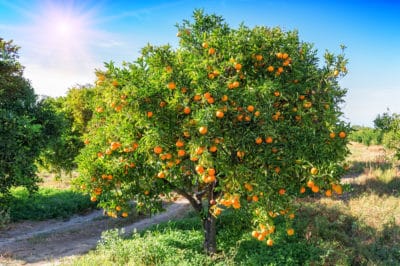Why Organic Fertilizer?
Over your orange tree’s lifetime, it soil will get benefits from an organic fertilizer that a synthetic one simply can’t supply:
- Organic fertilizers nurture the soil microbes that change soil nutrients into a root-absorbable form.
- Organic fertilizer releases its nutrients much more slowly than synthetic fertilizer, so it feeds your tree for a much longer time.
- Organic fertilizer contains no root-burning mineral salts.
- Organic fertilizer adds texture to the soil. It provides oxygen for earthworms and your trees roots and space for soil-building bacteria.
Expert gardener’s tip: Wherever they grow in USDA plant hardiness zones 9 through 11, orange trees need well draining soil. Without it, fertilizer won’t help much.
Fertilizing at Planting
When planting your tree, replace one-third of the soil with organic compost. Then add 1 cup (250ml) of organic, granular 5-2-6 citrus fertilizer to the compost/soil mix. You can find both at most garden supply stores.
Fertilizing a Growing Tree
Wait until your newly planted tree has grown 8 vertical inches to start a fertilizing program. Fertilize three times each year: Before it blooms in late winter, after it flowers in spring, and in early September to replace nutrients in the soil.
Fertilizer Amounts
Base the amount of fertilizer you use on the height of your tree:
- Up to 3 feet tall: 6 cups (1.3 liters)
- From 3 to 6 feet tall: 12 cups (2.6 liters)
- From 6 to 9 feet tall: 18 cups (4 liters)
- Over 9 feet tall: 24 cups (5.3 liters)
Scatter the fertilizer evenly along the tree’s drip line (where rainwater falls from the ends of its branches to the ground) and water it into the soil.
Micronutrients
The organic 5-2-6 fertilizer supplies tree with the macronutrients nitrogen, phosphorous and potassium. But for maximum fruit production, your tree also needs a range of micronutrients, including:
- zinc
- manganese
- iron
- boron
- nickel
- copper
- molybdenum
- chlorine
To determine if your tree has a micronutrient deficiency, arrange for a leaf or soil analysis. If it does, a foliar spray of the missing nutrients can correct the problem.
